Health
Older people missing out on benefits

AGE CYMRU helped older people in Wales claim more than £6.5m in benefits last year; additional income that could have a massive impact on the quality of life for those individuals who came forward seeking help.
However, this is just the tip of the iceberg as it’s estimated that more than £3.5 billion of state benefits available to older people in the UK goes unclaimed each year. In Wales this would equate to approximately £175 million of unclaimed benefits; a significant amount of money that could help bring about positive changes to thousands of older people in Wales.
Additionally, a recent study by the National Assembly for Wales found that more than 120,000 older people in Wales are living in poverty.
To help combat such levels of poverty amongst older people, Age Cymru has updated More Money In Your Pocket for 2019/2020; a bi-lingual guide to help older people and their carers claim benefit entitlements in later life.
The guide covers a wide range of benefits and entitlements, including state pensions, Pension Credit, help with Council Tax, help with heating costs, Attendance Allowance and Carers’ Allowance.
Take the case of Jack, who contacted one of Age Cymru’s partners for help in 2018.
Jack is 82 and lives with his wife Gwen who is 73. Jack has suffered six heart attacks and has several other debilitating diseases. As a result he has limited mobility and little stamina so rarely leaves his home.
An Age Cymru adviser undertook a thorough exploration of Jack and Gwen’s circumstances and identified that they were not claiming all their benefit entitlements.
In summary, Jack was awarded the highest rate of the Disability Living Allowance care component at £85.60 per week; Pension Credit for the couple was awarded at £119.00 a week and their Council Tax payments were reduced from £155 to £25 a month. They also received a number of backdated amounts, totalling £5,587.46.
As a result, their life has changed for the better. They can now afford to pay for food and heating and can also pay for transport if they need to go somewhere and therefore no longer feel trapped in their home.
Gavin Thomas, who manages the charity’s information and advice services across Wales says: “Poverty can have a devastating effect on an older person’s quality of life forcing many to choose between eating and heating. It can also keep an older person trapped in their homes leading to loneliness and isolation and, in many cases, poor mental and physical health.”
“Some people miss out on benefits because they mistakenly believe they don’t qualify or are put off by the claims process.
“However, older people might be surprised to learn what help is available to them. I would urge any older person in Wales to claim all their benefit entitlements and to use our guide as a useful tool to start the process.”
More Money In Your Pocket is available free of charge from Age Cymru and local partners throughout Wales. You may call the Advice Line free on 08000 223 444 or email [email protected] to order a copy. You may also download the free guide from our website: www.agecymru.org.uk/
The charity’s expert advisers can also carry out a full benefits check to find out what you might be entitled to claim. Age Cymru also offers a range of information guides and factsheets on many other topics.
Health
‘We are on our own’: Unpaid carers forced to ‘beg’ for support
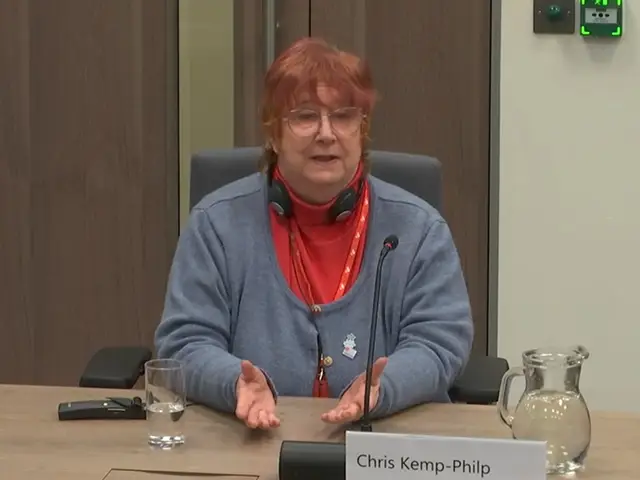
UNPAID carers are being left to “pick up the pieces” of a broken system due to a lack of respite, unsafe hospital discharges and carer’s assessments that result in “nothing at all”.
The warning came as the Senedd’s health scrutiny committee began taking evidence for an inquiry on access to support for more than 310,000 unpaid carers across Wales.
Chris Kemp-Philp, from Newport, who has been a carer for 33 years, gave up her career to become a full-time carer after her husband medically retired from the civil service in 1990.
Ms Kemp-Philp, whose husband died in April, told today’s (December 4) meeting: “I thought he’d been really badly treated… The last four months of his life were dreadful for both of us.”
She was only offered an updated carer’s needs assessment – a right under the 2014 Social Services and Wellbeing (Wales) Act – the day after her husband died.
Ms Kemp-Philp did not realise she had become a carer at first. “But, of course, having lost two incomes and to survive on a half civil service pension wasn’t great,” she said.
She told the committee how the couple “shielded” during the pandemic, saying: “For the past five years, basically, apart from going to a hospital or… a medical facility – I didn’t leave the house because if I’d have gone out, I could have brought something home.
“So, we spent five years literally avoiding people. The experience was unpleasant, I had two great-grandchildren born in that time and I only saw them on video.”
Ms Kemp-Philp said her husband was “pingponged” back and forth after unsafe discharges from hospitals in Gwent. He was put in a car by two nurses then she had to get him out on her own at the other end, with clinicians effectively telling her: it’s your problem now.
“Every time he was sent home, nobody came to help at all,” she said, explaining how she struggled to cope and her husband’s death brought a tragic sense of relief.
Judith Russell, who moved back to Wales to care for her mother 23 years ago, told Senedd Members the responsibility grew greater over the years.
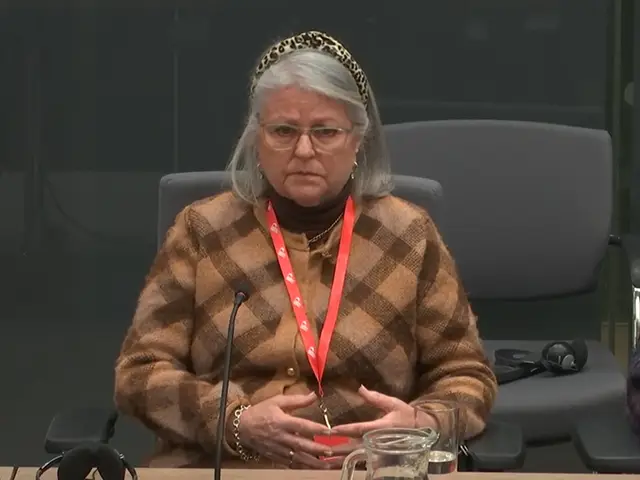
Ms Russell, whose mother died last Saturday on the eve of her 102nd birthday, told the committee: “It’s been my privilege to care for her but I wish other people—I wish there had been more actual care for her. That’s it.”
Ms Russell also cares for her husband who has Alzheimer’s disease, acts as guardian for her disabled sister and cooks every week for her sister-in-law.
“It’s quite a responsibility,” she said. “My life is taken up with caring. I didn’t actually know I was a carer, I cared for my mother because she was my mother – I looked after her, of course I did – and it wasn’t until about three years ago that I identified as a carer.”
Ms Russell warned: “All through this last 23 years, I’ve had to fight and struggle to find things out… there’s very, very little help out there.”
She said she was given a carer’s assessment earlier this year but “there was nothing they could offer me, quite frankly – nothing at all”.
Ms Russell told Senedd Members: “We had a diagnosis [but] there’s no offer of help, there are no directions to find help, somebody to point you – you should be doing this, this is available, that’s available – nothing, you’re on your own completely.”
She joined the Bridgend carers’ group which opened a door to other people grappling with the same weight of responsibility and helped navigate the system. Ms Kemp-Philp added that joining a similar peer support group saved her life.
Ann Soley, who is originally from France and has been living in Wales for eight years, described how life was turned upside down when her British husband had a stroke.
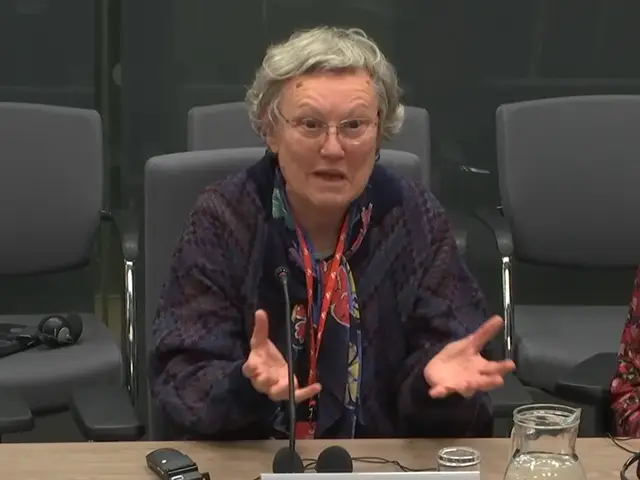
She said: “We are stressed, we are lost. A lot of carers have lost their friends, that is just unbelievable for me because I realised society is not there – there is no compassion.”
Kaye Williams, who works at Bridgend carers’ centre and is herself a carer, warned the witnesses’ experiences are commonplace across the country.
Sue Rendell, from Caernarfon, has cared for her husband who has vascular parkinsonism for nearly 14 years and was waiting for a doctor to call as she gave evidence remotely.
She told the committee: “You go in in the morning to see if he’s still breathing to be honest. We’re at the later stages of his disease and it’s physically demanding, it’s mentally demanding and it’s administratively difficult as well… it’s just very wearing.”
Ms Rendell, who was shattered after a late night caring, said she has tried to get respite but has been told there’s nothing available in Gwynedd nor Anglesey for her loved one’s needs.
She told the committee unpaid carers in Wales are “expected to pick up the pieces” but “nothing much happens” after an assessment. “Fine words butter no parsnips,” she said.
Ms Russell added: “As carers, we save the government millions… and I asked for some help this week actually. I’m 258th on the list for a hip replacement… and I asked the doctor: as a carer, couldn’t I possibly go up the list a little bit? ‘No, we’re not allowed to do that.’
“It’s the only thing I’ve ever asked for.”
Education
‘Sink or swim’: Young carer sat exam hours after 3am hospital ordeal
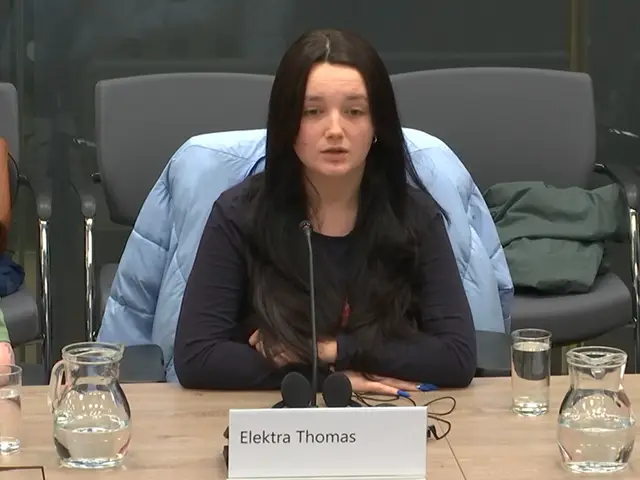
A TEENAGE carer sat a GCSE exam only hours after getting home from a hospital at 3am following a family emergency, a Senedd committee has heard.
The warning came as witnesses highlighted a “sink-or-swim” reality where children as young as three are taking on caring roles while feeling invisible to schools and social services.
Elektra Thomas, 15, who cares for her autistic, non-verbal brother and her epileptic sister, was part of a remarkable and articulate trio of teenagers who gave evidence to a new health committee inquiry on access to support for unpaid carers today (December 4).
The teenager helps her brother Blake get ready for school in the morning and helps him communicate by acting as his voice, which she has done since about three years old.
Ms Thomas told Senedd Members her sister has two children, “so I’m either handling her having a seizure, running around with her medication… or I’m looking after her kids”.
She said: “I’ve been having school assessments at the same time she’s had a seizure. I’ve been in ambulances waiting for her to get into a hospital while also studying.”
Ms Thomas explained how she is unable to focus on her schoolwork if her brother has had an overwhelming day. “I can’t focus on myself and I don’t have time for myself,” she said.
The teenager, who is from Carmarthenshire, described how she was once in hospital until 3am then sat a test – which went towards her GCSE grades – that same day.
Ms Thomas warned young carers do not have time to manage their own mental health, saying: “I didn’t have time for myself, I had time for my brother and sister and that was it.”
She said: “As a young carer who wasn’t noticed for a decade, it was pure manic: I had no coping skills, I had no support – and this has been going on since I was about three or four.”
Ffiôn-Hâf Scott, 18, from Wrexham, who is working while studying in sixth form, has similarly been a carer since she was four years old.
“I used to care for my mum and my sister,” she told the committee. “My sister used to be in a psychiatric ward, she was there for seven years.
“And I care for my mum because she’s diabetic, classed as disabled, has a long list of mental health issues, she has in the past suffered a stroke and had cancer.
“I don’t know how she’s still standing.”
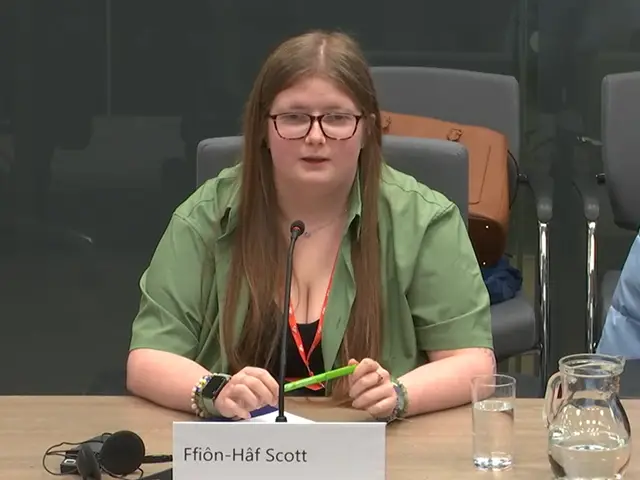
Ms Scott said: “The main challenge right now is looking after myself and learning that you actually have to keep yourself afloat… to keep looking after someone else.
“I think for a very long time I ran on nothing because of my caring role or I didn’t think about the things I needed to do for me, so respite and things like that.”
The Welsh Youth Parliament member warned a lack of support for young carers has been normalised, saying she has had to explain herself 70 different times while aged 12.
Ms Scott said: “I remember going to my teacher and saying – we had a piece of coursework – look I can’t do this right now… you’re going to have to fail me…
“Their response was just ‘well, you have too much on your plate and you need to take things off your plate’ and I was like: it’s very bold of you to stand where you’re stood and say that to me because it’s not a choice to take on the things that we do take on.”
She recalled receiving a phone call about her mum collapsing moments before a maths test and expressed concerns about the prospect of mobiles being banned in schools.
Albie Sutton, 16, a young carer from north Wales, looks after his disabled mother by doing things such as cleaning the house, budgeting and cooking for the family every day.
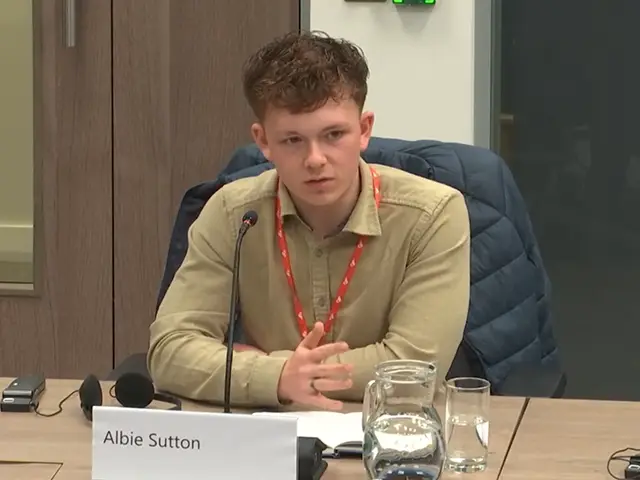
Mr Sutton said: “It’s a real struggle for her to move around the house, to even do stuff like getting dressed or moving to the toilet by herself… so I’ve got to help her.”
The teenager estimated his caring role takes up about 25 hours a week and makes it difficult for him to pursue some of his hobbies such as competing in powerlifting.
“My mind feels like a hive of bees,” he said. “There’s so many things going in and out… I get home at the end of the day and I’m like ‘oh my God, I’ve got to do this, I’ve got to do that’.”
Warning of the mental stress, he added: “It’s also really difficult for me to socialise… I feel very isolated in my caring role, especially at home. I’m always housebound, I never get the opportunity even just to go out in my local town.”
Mr Sutton told Senedd Members it plays on his mind that his younger brother may have to take on responsibility. “It’s got me debating whether I can go to university,” he said.
He called for a Wales-wide campaign to raise awareness among educators and employers of the issues young carers face and how to recognise the signs.
Ms Thomas agreed: “I’ve had multiple teachers look at me and go ‘what’s a young carer, sorry?’. I’ve had pharmacists go ‘are you sure you’re a young carer?’ and it baffles me.”
Health
Fresh alarm over life expectancy in Wales as CMO warns of ‘prevention revolution’

WALES is living sicker for longer, the Chief Medical Officer has warned, as new figures show a worrying drop in the number of years people can expect to live in good health – with women hit hardest.
The findings, published today in Dr Joanne Absolom’s first annual report since taking over from Sir Frank Atherton, have prompted immediate calls for the next Welsh Government to overhaul its approach to public health after the 2026 Senedd election.
Dr Absolom says Wales must now move decisively away from a system that largely treats illness towards one that prevents people becoming ill in the first place. Her report warns that healthy life expectancy is falling across the country and highlights widening inequalities between communities.
Responding to the findings, Darren Hughes, Director of the Welsh NHS Confederation, said the message could not be clearer.
“NHS leaders in Wales welcome the report’s call for a prevention-first approach,” he said. “We have to move from simply treating illness to actively promoting wellbeing, and that means a proper cross-government strategy that tackles inequality and gives people the support to take control of their own health.”
He added that every pound spent on proven public health programmes delivers an average return of £14 – evidence, he said, that prevention “makes moral and financial sense” at a time when NHS budgets are under extreme pressure.
“It is deeply concerning to see healthy life expectancy falling, particularly for women,” he said. “Investment in prevention is vital if we are to make our health and care services sustainable.”
While health boards, councils and community groups are already working on preventative programmes, the Welsh NHS Confederation says Wales needs far greater ambition – and the NHS must be given the tools and flexibility to scale up what works.
The Chief Medical Officer’s report also raises serious concerns about NHS workforce shortages and urges significant investment in digital technology to improve productivity and patient outcomes.
Mr Hughes said all political parties should “take heed” as they prepare their manifestos for next year’s Senedd election.
“Those seeking to form the next Welsh Government have a clear blueprint here. We cannot keep doing the same things and expect different results. Prevention, workforce and digital transformation have to be top priorities.”
The Welsh NHS Confederation — which represents all seven health boards, the three NHS trusts, HEIW and Digital Health and Care Wales — has already outlined its detailed priorities in its own election document, Building the health and wellbeing of the nation.
With the Senedd election just over a year away, today’s report adds fresh, authoritative evidence that Wales needs a radical shift in how it approaches health if it is to secure a healthier future for all.
-

 Crime3 days ago
Crime3 days agoDefendant denies using Sudocrem-covered finger to assault two-month-old baby
-

 Crime2 days ago
Crime2 days agoPembroke rape investigation dropped – one suspect now facing deportation
-

 News2 days ago
News2 days agoBaby C trial: Mother breaks down in tears in the witness box
-

 Crime15 hours ago
Crime15 hours agoProsecution delivers powerful closing speech in Christopher Phillips trial
-

 Crime3 days ago
Crime3 days agoLifeboat crew member forced to stand down after being assaulted at Milford pub
-

 Crime4 days ago
Crime4 days agoDefendant denies causing injuries to two-month-old baby
-

 Crime2 days ago
Crime2 days agoMother admits “terrible idea” to let new partner change her baby’s nappies alone
-

 Crime4 days ago
Crime4 days agoPembrokeshire haven master admits endangering life after speedboat collision


















